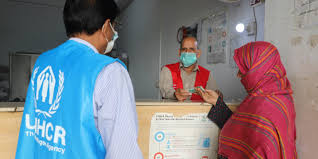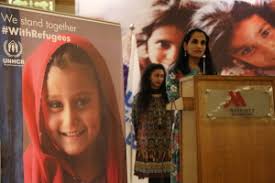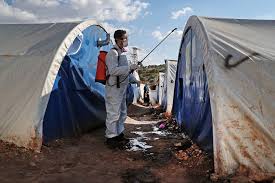Generous donor support provides relief to refugee women hard hit by COVID-19 pandemic

Islamabad: When the COVID-19 pandemic coupled with lockdowns across the world impacted millions of people, Afghan refugee women in Pakistan – who were heading their households – were also suddenly stripped of their only sources of income.
But they didn’t give up and rode out the crisis and challenges that hit them hard financially and psychologically.

“I had nothing to feed my family,” said the 24-year-old Fatima Bakhtiary, who carpet weaves in Attock and who is the sole breadwinner for her three sisters and mother. Two of Fatima’s sisters have health issues and are unable to work.
Due to coronavirus lockdowns in her locality, Fatima was stuck at home. “Lockdowns in two phases for many days forced me to buy some groceries on credit. Even then, I couldn’t pay my house rent,” she said.
Fatima and her family breathed a sigh of relief when she received a one-time Rs.12,000 emergency cash grant from UNHCR, the UN Refugee Agency. “It was temporary but timely relief for my family, and we are grateful. With this support, we were able to meet our most urgent needs, including paying back the debt for groceries and rent,” she added.
The United Nations High Commissioner for Refugees (UNHCR), in collaboration with the Government of Pakistan, announced in May this year the roll-out of this emergency cash assistance initiative benefiting the most vulnerable refugee families impacted by the COVID-19 pandemic in Pakistan.
Thanks to the generous support of the international community, in particular to Japan, the United States of America and the European Union, emergency cash assistance continues to be provided to those most in need.

Like Fatima, thousands of other refugee women who are heading their households are struggling to make it through the pandemic.
“The coronavirus outbreak has badly affected my naan (bread) business – subjecting us to hunger,” said Gul Naz, a refugee widow with five children living in Peshawar. She said she had been running her bread business from her home, but everything came to a standstill due to the lockdown.
She struggled to cope with the situation, but UNHCR’s cash assistance provided her temporary relief amid so many challenges.
The UNHCR emergency cash programme mirrors the Government of Pakistan’s Ehsaas emergency cash program, where vulnerable families receive a one-off cash grant of Rs.12,000 (approximately $77) covering a four-month period. UNHCR is targeting 70,000 of the most vulnerable refugee families.
“This emergency assistance aims to help the most vulnerable refugees overcome the challenges of the COVID-19 pandemic,” said Ms. Noriko Yoshida, the UNHCR Representative in Pakistan.
Although the lockdown is over, the struggles of refugees continue, including for Fatima and Gul Naz who support their families financially and hope to fulfil their dreams someday.
“I completed my grade 12, and I would like to continue my studies. I’m optimistic that one day my dream of becoming a judge will come true,” Fatima concluded.





